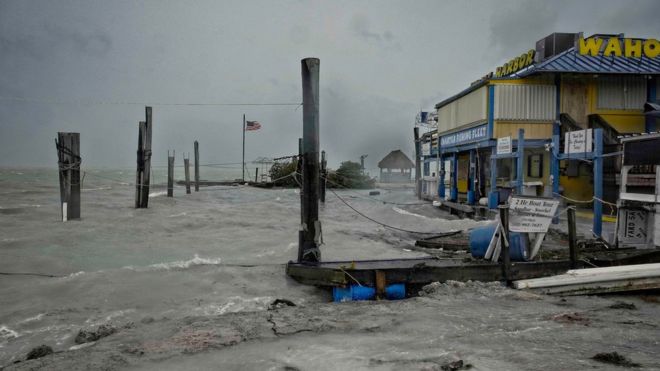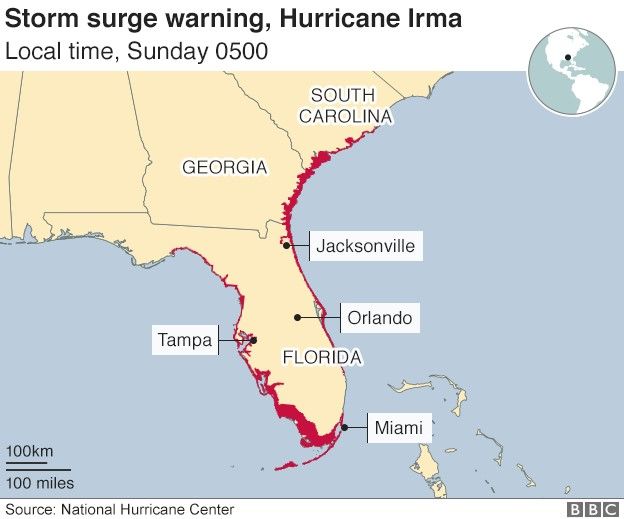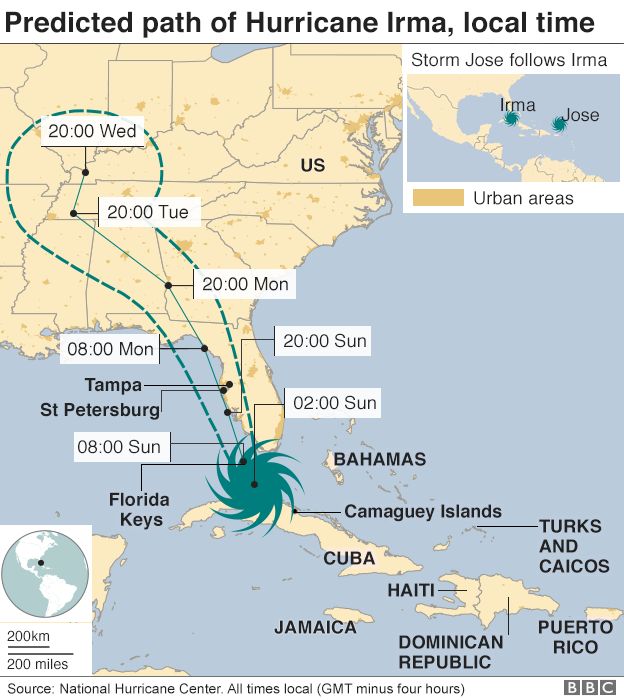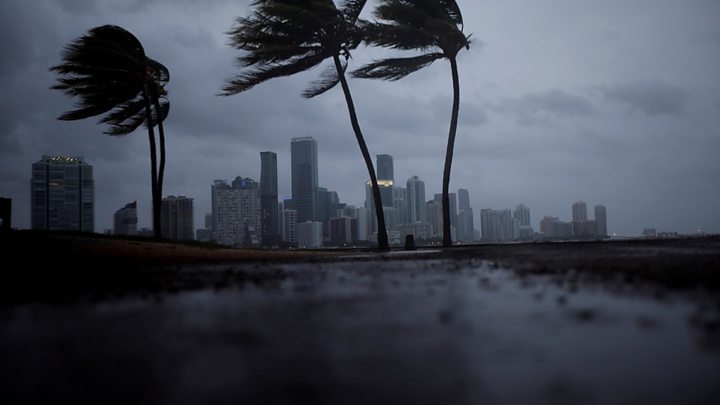 AFP
AFP
The eye of Hurricane Irma has hit Florida's southern islands as a category four storm, forecasters say.
The storm is expected to pummel the low-lying Keys with winds reaching 130mph (209km/h), before travelling north-west up Florida's Gulf Coast.
More than 6.3 million people were told to evacuate Florida, with warnings of a huge storm surge that would be "life-threatening" to anyone in its path.
Irma has already devastated parts of the Caribbean with at least 25 deaths.
What is happening in Florida?
Extreme winds, around the eye of the hurricane, are expected to last for the next two hours in the Lower Florida Keys area, which includes Key West.
All residents had been ordered to leave amid fears that a storm surge reaching 15ft (4.6m) could hit the coral cay islands, most of which are only a few feet above sea level.
One official had warned staying on the islands would be "almost like suicide".

As the eye of the storm is expected to move north to mainland Florida, more than 430,000 homes in the state are reported to be without power and some 50,000 people have taken refuge in shelters.
Cities such as Tampa and St Petersburg lie in the path of the storm. The Tampa Bay area, with a population of about three million, has not been hit by a major hurricane since 1921.
Florida's Governor Rick Scott told NBC's Today Show that though authorities had prepared all week for the arrival of Irma, the prospect of such a large storm surge was "really scary".

Which other areas have already been hit?
Irma is the most powerful Atlantic storm in a decade, and has already caused widespread destruction on several Caribbean islands:
- Cuba: Officials have reported "significant damage", without giving further details, but said there were no confirmed casualties yet, the AFP news agency reports
- St Martin and St Barthelemy: Six out of 10 homes on St Martin, an island shared between France and the Netherlands, are now uninhabitable, French officials say. They said nine people had died and seven were missing in the French territories, while two are known to have died in Dutch Sint Maarten
- Turks and Caicos Islands: Widespread damage, although extent unclear
- Barbuda: The small island is said to be "barely habitable", with 95% of the buildings damaged. Antigua and Barbuda Prime Minister Gaston Browne estimates reconstruction will cost $100m (£80m). One death has been confirmed
- Anguilla: Extensive damage with one person confirmed dead
- Puerto Rico: More than 6,000 residents of the US territory are in shelters and many more without power. At least three people have died
- British Virgin Islands: Widespread damage reported, and five dead
- US Virgin Islands: Damage to infrastructure was said to be widespread, with four deaths confirmed
- Haiti and the Dominican Republic: Both battered by the storm, but neither had as much damage as initially feared

What about Hurricanes Jose and Katia?
Another storm, Jose, further out in the Atlantic behind Irma, is now a category four hurricane, with winds of up to 145mph.
It is following a similar path to Irma and already hampering relief efforts in some of the worst affected areas.
Residents of Barbuda left the island as Jose approached but it is no longer expected to hit.
However, tropical storm warnings are in place for St Martin and St Barthelemy, both also hit by Irma.
Hurricane Katia, in the Gulf of Mexico, a category one storm with winds of up to 75mph, made landfall on the Mexican Gulf coast in the state of Veracruz late on Friday.
It has now weakened to a tropical depression.

Are you in the region? Are you a holidaymaker unable to get a flight home or a resident who has been preparing for Hurricane Irma? If it is safe for you to do so, share your experiences by emailing haveyoursay@bbc.co.uk.
Please include a contact number if you are willing to speak to a BBC journalist. You can also contact us in the following ways:
- WhatsApp: +447555 173285
- Tweet: @BBC_HaveYourSay
- Send pictures/video to yourpics@bbc.co.uk
- Upload your pictures / video here
- Send an SMS or MMS to 61124 or +44 7624 800 100
- Please read our terms & conditions
Or use the form below

No comments:
Post a Comment